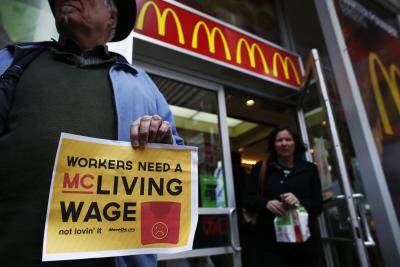The minimum wage could be one of the biggest political issues in 2014, and it’s surprising how many people would be affected by an increase in what society considers a barely acceptable pay rate.
We all know about workers at McDonald’s and Walmart, but how many would guess that “bank teller” is one of the jobs that can leave you stuck in the poverty class? ThinkProgress’s Alan Pyke summarizes a new report to that effect:
Three in ten bank tellers rely upon some type of anti-poverty public assistance program, such as Medicaid, the Earned Income Tax Credit, or food stamps, according to a new report from the Committee for Better Banks.The report pulls from research by the University of California Berkeley’s Labor Center to illustrate the disparities within the banking industry between executives and retail-level worker bees. According to the report, “salaries for bank tellers nationwide are so low that 31% of bank tellers and their family members are enrolled in some type of public assistance program.” In New York City, where the cost of living is far higher than the national average, 39 percent of full-time tellers need public programs to get by.
When workers who have to buy their own business attire worry about how they’re going to afford food (and they can’t put out tip jars), the minimum-wage issue resonates with a big chunk of voters. The National Journal’s Beth Reinhard notes a recent Gallup poll that found 76 percent of Americans, and 58 percent of Republican voters, support raising the federal minimum wage. (There are also strong majorities with this view in all major religious groups, including 78 percent among Catholics, according to a Public Religion Research Institute survey.) According to Reinhard, the Democratic Party—or, I would qualify, its “populist” wing—wants to own the issue:
Democrats increasingly view championing the pay of hourly workers as a can't-lose issue that revs up their base of liberal, black, and Hispanic voters. Perhaps more important, it also resonates with the white, blue-collar workers who overwhelmingly side with Republicans.Since minority participation tapers off in midterm elections, assailing Republican opposition to hiking the minimum wage could be a more potent Democratic wedge than immigration reform, particularly in red states with competitive Senate campaigns, such as West Virginia, Kentucky, Arkansas, North Carolina, and Louisiana.
Sen. Tom Harkin of Iowa and Rep. George Miller of California, both Democrats, have introduced a proposal to raise the federal minimum wage from $7.25 to $10.10—higher than any current state minimum wage—and then index it to inflation. (It would be $25 if it had kept pace with inflation since 1968.) Poll numbers notwithstanding, this has little chance of passing the GOP-controlled House of Representatives or overcoming a Republican filibuster in the Senate. It is an article of faith for conservative pundits that an increase in the minimum wage will cause employers to simply eliminate jobs. George Will differs a bit in arguing that it’s silly to raise the federal minimum wage when only 3 percent of American workers earn it, but it’s still serves as a benchmark for the 19 states that distinguish themselves by mandating a slightly higher wage, as well as for many employers that attract workers by promising a bit more than the stigmatizing $7.25 an hour. (I doubt that many of the bank tellers who depend on social welfare programs get exactly the federal minimum.)
The stuck minimum wage is part of the larger issue of growing income inequality in America (and around the world, as addressed by Pope Francis). The Monkey Cage’s John Sides argues, “The roots of inequality derive, to some extent, from the very nature of American politics.” He points to a study indicating that our legislative process sets an almost insurmountable barrier for remedies:
In a recent paper, political scientists Peter Enns, Nathan Kelly, Jana Morgan, Thomas Volscho and Christopher Witko advance a simple hypothesis: The government could act to mitigate the economic and demographic factors that increase inequality, but the American political system’s separation of powers and checks and balance make it difficult to pass such policies. Instead, there is a bias toward the policy status quo—one that Enns and colleauges argue only worsens as inequality itself increases. One important source of status quo bias in American politics has been the de facto super-majority requirement in the Senate—the need sometimes to win the votes of (initially) two-thirds and (later) sixty Senators.
The qualifier “sometimes” seems unnecessary, given that the GOP has made a political strategy of blocking every Obama administration proposal with “merely” majority support in the Senate. (The recent “nuclear option” exercised by Senate majority leader Harry Reid to limit filibusters so far applies only to presidential appointments, not legislation.) This strategy has led to what many call one of the most unproductive legislative sessions in American history, and it doesn’t bode well for an increase in the minimum wage.
Not that everyone is complaining about inaction in Congress. Libertarians can rejoice, as David Harsanyi does in Reason magazine:
Today’s intractable GOP Congress—despite its often amateurish politics, overreaches and missteps—is an organic safeguard against that kind of irresponsible centralized democracy. On that merit alone, it should be a lot more popular. And if the ideological gap continues to expand (both sides becoming more purist) and Washington’s big notions keep intruding on the ability of states and individuals to live by their own ideas and ideals, gridlock will be the only remedy. As hapless as the GOP has been, this is how the Founding Fathers planned it.
I doubt that the Founding Fathers could have imagined the consolidation of wealth in modern America, but their ideas on how to govern what was then a small, agrarian nation are likely to prevail for quite some time.
Photo: Woman exits McDonald's while fast-food workers protest for higher wages in New York (CNS photo/Eduardo Munoz, Reuters)








